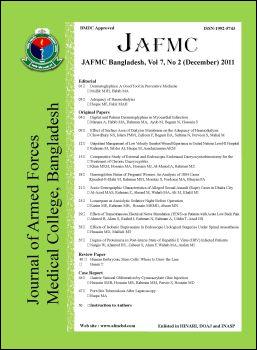Outpatient Management Of Low Velocity Gunshot Wound Experience In United Nations Level-Ii Hospital
DOI:
https://doi.org/10.3329/jafmc.v7i2.10388Keywords:
Gunshot wound, irrigation, marginal excisionAbstract
Introduction: Gunshot wounds are commonly encountered in war as well as in civilian situation. Experience of treating low velocity gunshot wounds (GSW) as outpatients in a war situation is depicted in this study.
Aim: The aim of this study was to evaluate the experience of treating low velocity gunshot wounds by simple wound irrigation and marginal excision in war situation.
Method: This was a retrospective observational study carried out in a Level-II Hospital of United Nations in Ivory Coast over a period of 7 months. All patients of low velocity GSW were treated with simple wound irrigation with normal saline and povidone iodine solution with excision of wound margin of doubtful viability under local anesthesia, rather than wound debridement.
Result: All wounds healed with 6% superficial wound infection that was controlled with oral antibiotics.
Conclusion: Outpatient management of low velocity GSW with wound irrigation and marginal excision is an effective method of treatment that can save time, money and hospital-stay.
DOI: http://dx.doi.org/10.3329/jafmc.v7i2.10388
JAFMC 2011; 7(2): 12-14
Downloads
192
296

